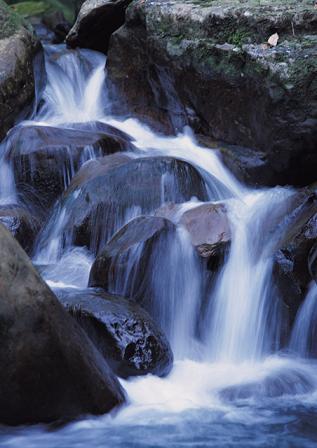WATER AND THE
COURSE OF HISTORY
|
| Water and civilization.
Water has been vital to the development and survival of civilization. The first great civilizations arose in the valleys of great rivers-in the Nile Valley of Egypt, the Tigris-Euphrates Valley of Mesopotamia, the Indus Valley of Pakistan and northwestern India, and the Huang He Valley of China. All these civilizations built large irrigation systems, made the land productive, and prospered.
Civilizations crumbled when water supplies failed or were poorly managed. Many historians believe the Sumerian civilization of ancient Mesopotamia fell because of poor irrigation practices. Salt in irrigation water is left behind during evaporation and tends to build up in the soil. The accumulation can be avoided by washing the salt away with extra water. But if the land is not well drained, it becomes water-logged.
|

|
The Sumerians failed to achieve a balance between salt accumulation and drainage. As a result, the salt and excess water harmed their crops. Farm production gradually declined, and food shortages developed. With the collapse of agriculture, the Sumerian civilization fell.
The challenge of today, as in ancient times, is for people to make the best use of water. But the challenge is greater than ever before because more water is needed as the world's population increases. Scientists estimate that nearly 50 countries will face water shortages by 2025. Also, many people do not conserve water, and they pollute water and manage it poorly in other ways.
Countries are working together to try to solve water problems. The United Nations (UN) has been heavily involved in these efforts. In addition, groups of countries whose lands are drained by major rivers and seas have formed regional organizations to fight water pollution.

From 1965 through 1974, about 70 countries took part in the International Hydrological Decade, a UN program established to promote scientific research on water resources. In 1975, the UN founded the International Hydrological Programme (IHP) to continue the research. The IHP is a long-term program that is carried out in phases lasting three or more years. Each phase has a theme. For example, the theme of the fifth phase, for the years 1996 to 2001, is "Hydrology and Water Resources Development in a Vulnerable Environment."
In 1993, the UN General Assembly declared March 22 of each year as World Day for Water. Each year, the day's activities promote public awareness of issues related to the protection and use of fresh water.
|
One regional antipollution group is the International Commission for the Protection of the Danube River, which was established in 1998. Members of the commission include 12 nations whose lands are drained by the Danube in Europe. The organization operates an early warning network for oil spills and other pollution alerts. One of the commission's main projects is to recommend plans for cleaning up the sources of the most severe pollution of the Danube.
|
Contributor: Thomas M. Keinath, Ph.D., Dean, College of Engineering, Clemson University.
..: |


